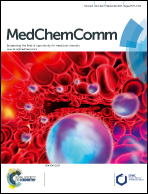Induction of apoptosis by cyclobutanones and derived polycyclic γ-lactones: a preliminary analysis of antiproliferative activity†
Abstract
A series of cyclobutanones (7a–f) were synthesized by irradiation of β-ionone derived chalcones (4a–f) in aqueous methanol and further converted to polycyclic γ-lactones (8a–f) by Baeyer–Villiger oxidation. Compounds 7a–f and 8a–f were evaluated for their cytotoxic activity against human cancer cell lines by using SRB assay. All the compounds displayed moderate to high cytotoxic effects against almost all the cancer cell lines. Compounds 7d and 8d showed comparatively high inhibitory potential against prostate (PC-3) cancer cells and were further investigated for their apoptotic potential against PC-3 cells. The investigation revealed that compounds 7d and 8d induced plasma membrane blebbing in treated cells, and decreased mitochondrial membrane potential (ΔΨm) with elevation of the ROS load, thereby indicating induction of apoptosis in PC-3 cells via a mitochondrial pathway.


 Please wait while we load your content...
Please wait while we load your content...